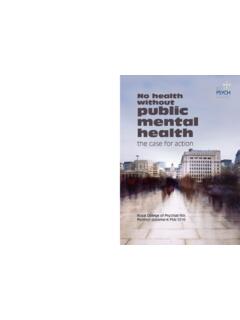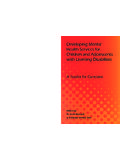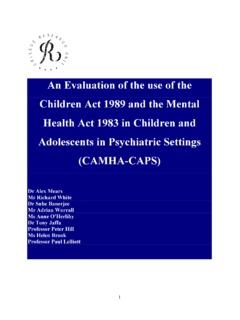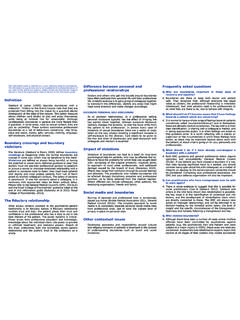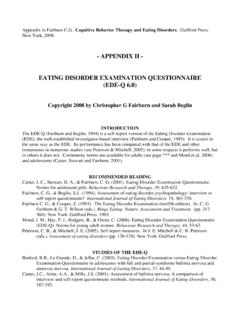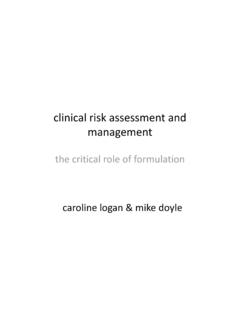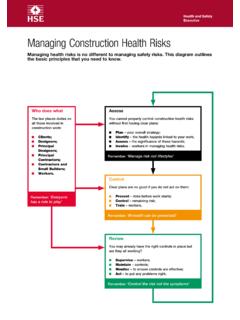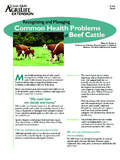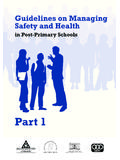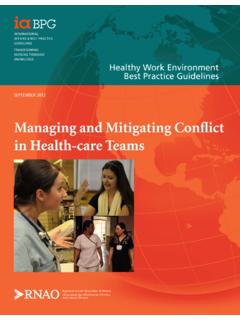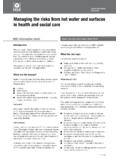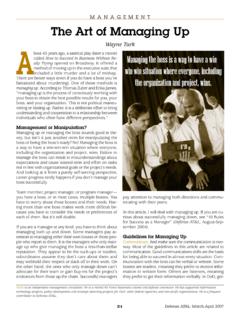Transcription of Managing Urgent Mental HealtH needs in tHe …
1 Managing Urgent Mental HealtH needs in tHe acUte trUst:a guide by practitioners, for managers and commissioners in england and WalesThe College ofEmergency Medicine Copyright Academy of Medical Royal Colleges 2008 Printed byPPG Design and Print LtdDesigned and Typeset byMillbank Media Ltd Managing Urgent Mental HealtH needs in tHe ACute tRust:It is a matter of shame that this document is needed, but needed it most certainly is. We witness Mental distress and Mental illness daily, in people of all ages and in many different circumstances. Yet in our society they command less priority than do physical problems.
2 Whatever the reasons, and the judgements and prejudices that still surround Mental problems, they cannot ever warrant the relative neglect that people experience and report in the circumstances described in this document. In few places is this relative neglect more common or more evident than in the emergency departments and the medical and surgical inpatient wards of acute hospitals. Many people are brought to Emergency Departments in acute distress, often in despair some having harmed themselves deliberately; many are seriously disturbed or made ill by substance misuse, many are distressed as a consequence of the illness or injury that has brought them to hospital.
3 And among people with a physical illness or injury serious enough to require admission, a high proportion of them have a Mental HealtH problem, frequently masked or overlooked. We are reminded that 60% of acute hospital inpatients over 65 years of age will have a Mental HealtH is right that College of Emergency Medicine,the Royal College of Psychiatrists and the Royal College of Nursing have led together in the preparation of this document. But the concerns they identify and address are for everyone with responsibilities in acute medical and surgical care, in the Emergency Department or in the wards, whether they are healthcare professionals, managers or commissioners of acute services.
4 Neither, of course, are acute Mental HealtH problems limited to the acute hospital. They arise in the community, are common in primary care, and they often persist when patients leave hospital. Mental illness and Mental problems, including those of people with learning difficulties, occur in patients of all ages and of different racial, religious and cultural backgrounds. Their problems take many different forms, and different patients bring a variety of specialised needs . Often these needs are clinical and medical, but almost always they reach into family, social or working life.
5 It is usually very difficult to have every specialised element to hand even in large acute hospitals, or for non-specialist staff to be in a position to call in the appropriate specialist help. That is why Acute Psychiatric Liaison Services are an essential part of a whole acute service, ready to respond at any time, to draw in the specialist expertise appropriate to the problem and to arrange the necessary collaboration within, between, and beyond hospitals. This document describes the characteristics of a good acute Mental HealtH service. It sets out clearly and firmly the principles and standards that we expect to be applied to any acute medical and surgical service.
6 These should be essential features of the psychiatric specialty service that supports the Emergency Department and the medical, paediatric and surgical wards. The input of Mental HealtH services to Emergency Departments and to acute hospitals is a vital element of the delivery of a modern, responsive and integrated service to patients. The same standard of Urgent assessment, diagnosis and intervention should be provided for Mental HealtH care as is expected for physical HealtH care. This requires an extension of current standards to cover practice in these acute services, commissioning of services and assessment of performance.
7 Successful implementation of these developments will require enhanced training opportunities for staff working in the Emergency Department, and in medical, paediatric and surgical wards. There must also be clear understanding of clinical responsibilities across the specialties. The Academy hopes that this document will serve to give a strengthened impetus to the improvement of these services through commissioning, training and practice, with much needed and sustained improvement in the experience of affected patients and their dame Carol blackChair Academy of Medical Royal CollegesfoReWoRdA guide by pRACtitioneRs, foR MAnAgeRs And CoMMissioneRs in englAnd And WAlesMAnAging Urgent Mental HealtH needs in tHe ACute tRust:ContentsMeMbeRs of tHe WoRking pARty.
8 3executive summary ..5 summary of Recommendations ..6 potential benefits of these recommendations ..81. introduction ..92. Remit and terms of Reference of the Working 3. Current provision and background ..11 Local Configuration of Services .. Table 1- current service models for psychiatric support to the Emergency Department .. Recommended response times .. Place of Safety Issues .. Funding of Services .. Involvement of Primary Care ..4. the ideal service ..15 Guiding Principles .. Specific Mental HealtH services needed .. Service roles and responsibilities.
9 5. service standards ..166. Characteristics of a good acute Mental HealtH service ..17 Pathways to Mental HealtH Care through the Emergency Department ..7. training and education ..198. Commissioning standards ..209. Conclusion .. guide by pRACtitioneRs, foR MAnAgeRs And CoMMissioneRs in englAnd And WAles23 This report was prepared by the Royal College of Psychiatrists, working in partnership with representatives from the Royal College of Physicians of London, the Royal College of Nursing and the College of Emergency report was endorsed by the Academy of Medical Royal detailed work leading to this document was carried out by a working group set up by the Royal College of Psychiatrists in June 2007.
10 The group comprised: professor sheila Hollins, President, Royal College of Psychiatrists (co-chair) professor sir george Alberti National Director for Emergency Access and Service Reconfiguration (co-chair) dr paul gill, faculty of liaison psychiatry Royal College of Psychiatrists (lead author) Mr Jim Wardrope President, College of Emergency Medicine (assistant author)Other members of the working group were: dr dave Anderson Faculty of Old Age Psychiatry, Royal College of Psychiatrists professor sue bailey Registrar, Royal College of Psychiatrists professor derek bell Imperial College, representing Royal College of Physicians dr Anne bird Faculty of General and Community Psychiatry, Royal College of Psychiatrists professor Colin drummond Faculty of Addictions.
